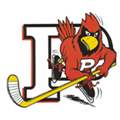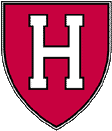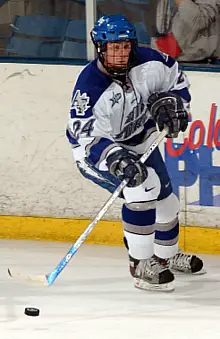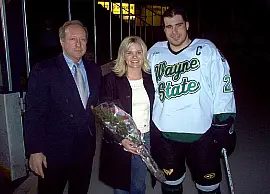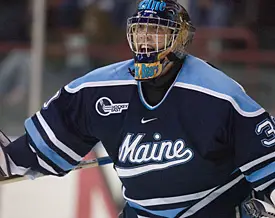The Semi-Awful Truth
In theory, someone will pick up some points in the CCHA this week. It has to happen.
Sure, I know that Earth is round, that illness isn’t caused by an imbalance of humors and that gazing into an emerald won’t make your eyesight perfect (although I’d be willing to put that idea through some extensive testing).
I’ll take a leap of faith and state for the record that at least a couple of CCHA teams will win a conference game or two this weekend, and what a thankful thing that will be.
There are six teams playing three CCHA series Thanksgiving weekend, and these six teams are the current bottom six in league standings. In the 38 league games played among these six so far this weekend, there are six wins. Three teams — Alaska, Lake Superior and Ohio State — have yet to taste victory in conference play.
In some ways, this is another case where numbers can lie. Alaska and Lake Superior State have played just four league games each. For Alaska, those losses came to the defending champion Michigan State Spartans at home and a two-game road trip to Yost Arena. The Lakers also lost two to Michigan (but in Sault Ste. Marie, as if that matters), and the other two LSSU losses were to the defending CCHA champs, Notre Dame, in South Bend.
And three of poor Western Michigan’s five league losses have come in overtime, two to the improved Bowling Green Falcons.
“The three overtime games that we’ve played, those are games that obviously are difficult in the sense that they’re disappointing” said WMU head coach Jim Culhane. “You don’t get anything for your hard work in those games, and you don’t get any points. You have nothing to show for it in the standings.”
Of the bottom six, Nebraska-Omaha has the most points so far, with six for UNO’s three league wins, having most recently split with Ferris State at home and swept Ohio State on the road.
Two remaining two teams in the bottom six, Northern Michigan and Ohio State, potentially are in for long seasons.
With 10 CCHA games played, NMU has seen more league action than any other team save Miami, with just two wins in 10 games played. Again, though, with NMU the raw numbers can be misleading. Six of those losses came against Michigan, Michigan State and Miami, and the Wildcats never trailed in their 3-2 over BGSU last Saturday, a win that earned them a split on the road.
But there are issues there. Northern has played a third of its CCHA schedule, leaving the Wildcats to play catch-up for the rest of the season. And they’ll do so with three goalies that have contributed to a team save percentage of .857. Sophomore Brian Stewart (2-6-0, .843 SV%) has seen the bulk of the time in net, but freshman Reid Ellingson (1-2-0, .882 SV%) and sophomore Derek Janzen (.848 SV%) have also seen time in net. Janzen has one recorded loss, but is credited with 177 minutes in five games played.
Clearly, someone has to provide stability in that net in front of a very young team.
“We have 15 freshmen and sophomore starting for us every night, and they have to contribute if we’re going to be good,” said NMU head coach Walt Kyle. “We can’t rely on four or five upperclassmen.”
Or just one. At least junior Nick Sirota has 10 goals.
Then there are the Buckeyes, who have been outscored 28-8 in six league games. You can read more about their woes, separately, below.
Once again, we appear to have a CCHA of the haves and have-nots. Four teams ranked and clearly better than the rest of the pack…and everyone else. “Those four teams are right there,” said Culhane, “are as good as anybody nationally.”
Sigh. If history repeats, a couple of squads may bottom out with single-digit league wins.
It’s enough to leave a fan feeling a little ungrateful this Thanksgiving, or perhaps looking at the world through grass/WCHA-is-always-greener lenses.
And that’s when Red Berenson, the Michigan head coach from whom we’ve come to expect such logic and reason, comes to the rescue, providing the perspective necessary to enjoy these games again.
“Two years ago, Notre Dame was hardly in the playoffs. The parity thing will sort itself out after Christmas.”
Thanks, Red.
Jim Says…and So Does Jim
Three ties in four games. It’s enough to make anyone but Jim Culhane grumpy.
“It’s about competing and executing,” said Culhane, whose Broncos host Ohio State this weekend. “You need to compete at a high level, and you need to make plays. If you do that, you’re going to give yourself a chance. If you don’t, you’re not giving yourself an opportunity.
“I look at the games that we’ve played, and other than the Notre Dame series, we’ve been in every game, competed at a high level…they have a really good club.”
Last weekend, the Broncos lost twice to the Irish in South Bend, outscored 9-2 in two games against the Irish. In Saturday’s contest, WMU had just 11 shots on goal, a new team record. Scoring isn’t the singular, major issue for the Broncos, who have been out-tallied by opponents 33-26 in 10 overall games.
It’s not any one thing that’s going wrong, because nothing about WMU needs genuine triage. “We’re looking to improve and get better as a team,” said Culhane. “Our focus is on us, and how we’re going to prepare come Friday and Saturday.
“Statistically we’re in the middle of the [CCHA] pack — goals against, power play, penalty kill. For us, we’re working extremely hard. I like the way that the team continues to battle. What we’d like to see now is to get some reward.”
Another hard-working Michigan squad is Lake Superior State, whose head coach Jim Roque also remains optimistic in this young season.
“I like our team…but our goalies haven’t played great, but at the same time our we’ve left our goalies out to dry. I think our biggest problem is that we have guys that are doing things that are hurting the team.”
Roque’s not talking about anything nefarious; he’s talking about players who tend to grip the stick when things get tight, guys who want to do it all themselves and therefore make the kinds of mistakes that end up in your net.
Even though the Lakers lost 5-1 and 6-2 at home to the Wolverines last weekend, both Roque and Berenson said that the scores weren’t indicative of the games.
“We played well against Michigan,” said Roque. “At the end of the day Monday…I can’t really get down on my guys too much. We played really well.
“Our guys played hard, but we have some guys…that are turning the puck over in bad spots. They need to be a little more team oriented right now even though it’s not going well for them.”
Said Berenson, “We were behind 1-0 on Friday, and behind 2-0 on Saturday. Billy Sauer is playing much better. We’ve been lucky.”
Michigan’s junior netminder was sometimes a liability his first two seasons, but against the Lakers Sauer helped UM’s penalty killing unit stop LSSU 15-for-15 times, including a couple of 5-on-3 Laker opportunities Saturday.
“He played really, really well,” said Roque, who remembers what a good goaltender can do for a team. “We’ve been the benefactor of that too.”
The Lakes may have netted just three against Sauer and the Wolverines, but LSSU outshot UM 36-31 Saturday and put up 25 shots on Michigan Friday.
“We haven’t scored much,” said Roque, “but it’s not for lack of opportunity.”
This weekend, the Lakers play home-and-home with fellow Yoopers, Northern Michigan. On paper, the teams are very evenly matched, with each lingering near the bottom of the stats in the CCHA in team offense, defense, power play, and penalty kill.
“I think both teams are at a point now that we’re not in any position to worry about what the other guys can and can’t do,” said Roque.
It’s Show Time!
Well, Showcase time, anyway.
As they have done every year since 1993, four teams — Michigan, Michigan State, Minnesota and Wisconsin — will showcase how hockey is played in the Big Ten.
Well, sort of. There’s no Big Ten conference, and no Big Ten trophy, and there is another Big Ten team that plays college hockey that’s never invited to this particular show.
“We need to play for a Big Ten championship,” said MSU head coach Rick Comley. “I’m not talking about a Big Ten conference.
“The Big Ten Network wants it, the schools want it. We can do this without any damage to either league. Of course, it would require all of us to play each other two times a year.”
Without taking anything away from either the CCHA or the WCHA, such a championship — as Comley knows — would be good for college hockey. With the name recognition of the five Big Ten teams who have Division I programs, it would be an opportunity for the sport itself to grow.
Comley said that he looks forward to the Showcase because of the opportunity to play more Big Ten games. That it comes during the Thanksgiving weekend is the only “bad thing,” said Comley. “I’d rather play them at home when student fans are here.”
This year, the Showcase is also an opportunity to show that the CCHA is as competitive as the early winning and poll votes would indicate. Last weekend, the Spartans lost two games to top-ranked Miami, in East Lansing, 4-2 and 3-1. The RedHawks had empty-net goals in each contest, making the games even closer than the scores indicated, but Comley said that the Spartans were outmatched both nights.
“The games were close score-wise, the quality of play was not,” said Comley. “I thought we tried hard, but we didn’t play smart. We’ve seen this all year. We play sloppy, were turn the puck over. We’re capable of playing better.”
The losses make the current defending national champion Spartans 0-3-0 this season against ranked teams; MSU started the season with a 6-0 loss to North Dakota. The losses also snapped MSU’s eight-game win streak, during which the Spartans beat Colgate, Northern Michigan, Alaska and Mercyhurst.
Michigan State isn’t the only semi-tested team from the CCHA to play the Showcase this weekend. The Wolverines are 11-1-0 heading into games against Wisconsin and Minnesota, which has head coach Red Berenson “a little surprised.”
“We’ve got all these freshmen, and three of our six defensemen every night are freshmen, and six of our forwards are freshmen,” said Berenson. “We’ve played eight games in the league, six of them on the road.
“On other hand, we haven’t played anyone with a .500 record. Those are the kinds of teams we’ve played. We haven’t played the best teams.
“Our record is better than our team. I have to give our team credit. I thought that we could get killed on the road.”
Berenson calls this weekend “a bit of a wake-up call” for the Wolverines, who most recently swept Lake Superior on the road and who are riding a 10-game win streak into the Showcase, having also beaten twice each Northern Michigan, Boston University, Nebraska-Omaha and Alaska.
“We played Minnesota the first weekend of the year at Minnesota,” said Berenson of UM’s 4-3 loss to the Gophers Oct. 13. “They won the game, but we may have outplayed them.”
Berenson said that Wisconsin and Minnesota have “really handed it” to MSU and UM in the Showcase in recent years, and both he knows as well as Comley what’s at stake here.
“I think it’s a chance to keep our image going up, or it will be a chance to question the CCHA. It’s a question of where we are.”
A Thankless Job
I took some email heat last Friday for my picks in the Robert Morris-Ohio State series, where I called OSU to lose two. At the end of the end of the weekend, RMU was 1-0-1 all-time against OSU, proving that the top team in the CHA can, indeed, beat the bottom team in our very own CCHA.
I don’t care much about making picks and predictions — I really think it’s an XY-thing — and I often make picks very tongue-in-cheek, but I was serious about the Colonials sweeping the Buckeyes because Ohio State has become a team that knows how to lose.
“Score the other end of the ice. That’s all we’re asking them to do. And win your fifty-fifty battles. And I’ve got to find out why it’s not happening. It’s disappointing. Our defense is terrible. Our defensive zone is terrible.”
That is John Markell’s summation of last weekend and, indeed, the entire Buckeye season thus far. The OSU head coach didn’t mince words after Ohio State failed to produce a win in the two contests, both of which OSU led. Friday’s 5-5 tie in Pittsburgh was a spectacular implosion; leading 5-2, OSU allowed three RMU markers in the second half of the second period.
Markell called his players’ dedication to the sport and Ohio State into question after Sunday’s contest, saying that if his players weren’t able to overcome adversity during a game — such as when RMU scored two quick ones Sunday to take the lead — then “they should never have come here.”
He said that players were able to display an ability to overcome before becoming Buckeyes and that “they’re being allowed to play here,” and therefore a sort of resiliency is the “kind of attitude [that] has got to be displayed.”
“I’ve got to get it out of them,” said the impassioned coach. “It’s not burning in there yet. It’s not burning in there. I don’t know how it can’t be.”
Two things from Sunday’s game stood out to me:
1. The Tom Biondich goal at 8:59 in the second (less than a minute after Jason Towsley scored the tying goal for RMU). During that goal, there were literally four Buckeyes — three seniors — in the crease besides goaltender Joseph Palmer.
2. The Colonial who was allowed to approach Palmer, unabated, after the whistle blew in the second. Palmer gloved the puck, the whistle blew, and an RMU player skated up to the Buckeye goaltender to challenge him. Palmer, of course, shoved him back a little but he shouldn’t have had to…since there were two other Buckeye players standing there who did absolutely nothing.
All I know is that this is the single most spectacular meltdown of a team I’ve ever witnessed, given OSU’s play the first weekend.
And when the coach is publicly grousing even a little, there’s more than just a little problem here.
On the Other Hand…
It was good to finally have empirical proof that the Robert Morris (!) Colonials do, indeed, exist.
The Colonials played hard and smart, and did what they had to do to take advantage of a team that’s learned to lose. They were very pleasant visitors, they have snappy navy away uniforms, and head coach Derek Schooley is a Western Michigan graduate who was good natured about my jabs at RMU, which are of course really swipes at a few of the teams in this league.
In fact, Schooley was so gracious that I’ll forgive him for reminding two of the three reporters in the room post-game that he’s younger than we are. On Friday’s 5-5, come-from-behind tie against OSU, Schooley said, “Pittsburgh fans loved it, though. Our people that we had there were asking, ‘Is this how you play all the time?’ I’m going to be bald and gray by the time I’m 40 if we play like that all the time, 5-5.”
By the time he’s 40. How cute.
Schooley did wax nostalgic about his playing days for Western and the old OSU ice rink. “I walked over there to look at it. I tore my ACL there my junior year. A defenseman fell on my leg…in what would have been 1993.
“I scored my first college goal there on Mike Bales [with] a goalie in net. My freshman year was an empty-netter, but my sophomore year was my first college goal there, so I wanted to go back and relive the glory, relive the dream.”
I’d say that the Colonials now have new glory to add to their lexicon, given their all-time series against OSU.
Ungrateful?
Earlier this week, USCHO.com reprinted an article by CHA correspondent Matt Mackinder, in which Mackinder reports that Wayne State University athletic director Rob Fournier is grousing about the CCHA’s treatment of the WSU hockey program.
“I tried to get more big-name schools to come here,” said Fournier, “but the CCHA just wouldn’t accommodate me in that regard. I figured if we could get some big-name schools to our place, more people would come out and see that we have a good product here. No one knows who Sacred Heart is or who St. Lawrence is, but everyone knows Michigan and Michigan State.”
Wow. The CCHA just “wouldn’t accommodate” the Warriors because more schools couldn’t schedule the Warriors in Detroit?
The implication, of course, is that the CCHA didn’t do enough to help foster Wayne State hockey and is in part to blame for its demise.
Fortunately, CCHA commissioner Tom Anastos knew just how to respond — factually.
“CCHA schools have played more than 50 games against WSU over the years,” said Anastos. “In fact, this year, Wayne State has 10 games on their schedule against CCHA schools, including three at home. Rob Fournier keeps mentioning Michigan and Michigan State. Well, everyone would like to play those schools at home, including our members [which don’t every season because of our scheduling restrictions], but based on the limited number of nonconference games available, that’s just not as easy as it sounds.”
Fournier also alleged that WSU was rejected for membership by the CCHA, but in the article the CCHA said that Wayne State never applied to the league.
Mackinder also reported that at the 2006 WSU hockey banquet, Fournier said that Wayne State would soon be affiliated with “schools in Ann Arbor, East Lansing and Kalamazoo.”
For the CCHA’s part, Anastos said he met with Fournier before WSU announced plans to drop men’s ice hockey to “discuss a scheduling concept that would rotate games, both home and away,” about which Anastos said CCHA schools “were open-minded” as long as WSU “address[ed] some issues that were of concern to” the CCHA.
“Shortly thereafter,” said Anastos, “the program was dropped.”
To suggest that the CCHA is in any part responsible for the demise of WSU hockey is cowardly. The CCHA routinely schedules nonconference games against blossoming programs and the league appears to want to extend a helping hand for the greater good of college hockey whenever it can.
Everyone in the CCHA admires and respects Warriors’ founding — and, sadly now, only — head coach Bill Wilkinson, a long-time coach in Western Michigan. And everyone in the CCHA stood to gain from the recognition the sport garnered in Hockeytown itself.
Sadly, with WSU out of the Division I mix, that leaves a four-team College Hockey America — which is not a good thing in any way. As I’ve advocated before, the CCHA could extend another helping hand and bring aboard Robert Morris and Alabama-Huntsville, expanding the league’s influence east and south, and providing college hockey of a higher profile in two significant markets.
As far as Fournier’s comments, my gut tells me that there’s more than what we’re seeing on the surface. The short week prevents further immediate investigation in time for this column, but I’ll be on it, as I’m sure will my esteemed colleague Matt Mackinder.
Happy Thanksgiving!
And what a good reason for the week to be shortened! Thanksgiving is my favorite holiday. Many of us have much for which to be thankful, and expressing gratitude is a genuinely positive experience.
As always, I’m grateful to the entire hockey community, from everyone who stops by weekly to count my typos and occasionally laugh on purpose, to my wonderful colleagues at USCHO, to everyone involved with the league I’m lucky enough to cover, to the sport that never fails to thrill me.
Thanks everyone. Have a safe, happy holiday.
